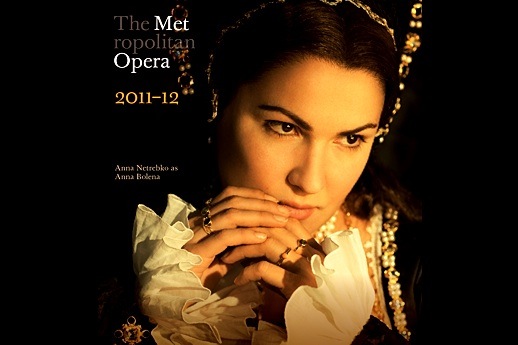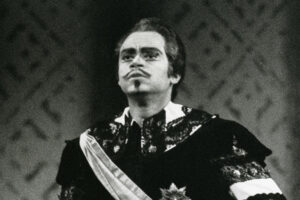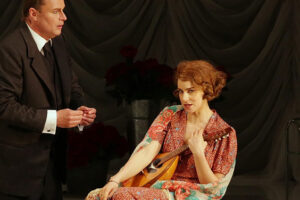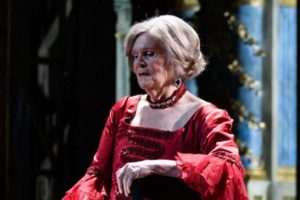

Question: Are standards going south with all this newfangled experimentation, and is this going to lose your audience?
Gelb: This is not so experiemental. These are distinguished directors who have had successes throughout the world. Opera if it does not present new productions will not attract new audiences, and eventually will become an extinct form. The average audience age now is 8 years younger than it was when he arrived, and donations are at highest level ever.
Question: what’s happening with new works from musical theater composers?
Gelb: Nico Muhly’s Two Boys at ENO in June, at the Met a few years from now. A new work requires a lot of time and effort, not done overnight.
Question: Why doesn’t maestro Levine take a bow?
JL: After a performance, the first couple of minutes sometimes difficult.
Question: There is some back and forth about how the Met is on the big side for Handel, and I saw such and such at such and such a theater, etc. etc.
Question: Are HD viewers attracted to live performances, is it building the live audience?
Gelb: Tour guides say most come to the Met to see a landmark from an HD telecast. So this is indicative of their coming to NY to see opera at the Met.
Levine: The thrilling bit, gives him chills, when he hears the host on HD say, “go to the live performance.”
Gelb: Many benefits to HD. Saturday matinees are higher energy, performers give their best of the run. Channel excitement into positive artistic results.
Levine: Audience is fresh at a matinee; everyone rises to the occasion.
Gelb: Audience feels part of event.
Question: is there a Shreker in the future, or a Montemezzi?
J: Maybe a Montemezzi?
Question: Ticket prices, and how is the financial status?
Gelb: The Chagalls are not at risk. The financial crisis has had a lingering effect on the Met. It’s a burden we continue to bear. Ticket sales at first increased, has leveled off lately. On the other hand, Nixon in China is selling out. Met is not a business model he would will on anybody, but the product is great art.
1:50: David Daniels sings a bit of the show. It’s a Vivaldi piece set to new Sams text. This being a da capo, he turns back to page one. It’s pleasant enough, though one wonders about a whole evening of this sort of stuff.
1:45: William Christie explains that The Enchanted Island is a pasticcio; he and Jeremy Sams are fitting together Handel, Rameau others to a story beginning with the lovers from Midsummer Night’s Dream shipwrecked on Prospero’s island from The Tempest. There are no “thees and thous” in the libretto. This looks like the most interesting design of the season, fantastical creatures against painted drops in baroque style. David Daniels as Prospero is a sort of Benjamin Franklin, and Domingo is the deux ex machina. Joyce DiDonato will have fantastical headdresses!
1:40: Des McAnuff directs Faust. First half of 20th century, begins with the atom bomb ending WWII, the Faust’s youth is immediately following WWI. Faust never leaves his laboratory; it transforms into all the scenes. Period moves through 20s and 30s, costumes are dreamlike manifestation of Faust’s imagination. This will be the New Year’s Eve gala with Kaufmann, Gheorghiu and Pape.
1:35: Laurent Pelly directs Manon, with Anna, Piotr Beczala, Paolo Szot. This is the “Gigi” production from Covent Garden. “Anna has a huge power of seduction over the audience.” His approach: a man’s view of women at the end of the 19th century. A free woman is dangerous, as in Carmen and Traviata, and must be sacrificed. Chorus of men in black formal dress, very threatening.
1:30: PG says Michael Grandage was one of the first directors he approached as new manager. Grandage: sex and sexual politics are at the center of the piece. In the period, there is a literal notion of hell. Central characters are from upper part of society, costumes theatrical in the best sense of the word. Weathered Mediterranean colors of set: looks like a big revolving unit with lots of doors and shutters on three levels of balconies (like interior hallway of opera house?)
1:27: Devid McVicar and Anna Netrebko talk about Anna Bolena (on film). Anna: “Has a lots of challenges. Difficult to sing. I have to use all my skills to perform this role at the best level.” This production will be shared between the Met and Covent Garden. Anna has listened to recordings of Callas, Beverly Sills and Leyla Gencer.
Production follows Holbein paintings. Anna: “She was very ambitious, she wanted power, to be a queen, she get it for a very short time. The drama is in how fast everything happened for her.”
1:25: Gotterdammerung set will suggest German expressionism/Fascist aesthetic. Sculpted and symmetrical. A reconcilation at the end: man reconciles with himself. The presentation shows more configurations of the “machine” from Rheingold.
1:22: Projections using fractals (eh?) which have never been used before, to create a 3-D effect, will be used in the Siegfried forest scene. Lepage talks about the sensuality of Siegfried, which will include 3-D vermin effects, danger under the ground. Gelb is in Spock mode: “Fascinating!”
1:20: Gelb talks about the new Ring. A film of Robert Lepage. Note that the posters on the wall introducing new productions include a photo of Gary Lehman as Siegfried: quick work!
1:15: James Levine speaks: the difficulty is keeping everything in balance. He thinks all elements of the house are in extremely good form, working hard but well. Conducting roster better than it has ever been.
1:12: CONNECTED! Peter Gelb is introducing. He just came from his office where Anna Netrebko was asking to have a cut opened in Anna Bolena.
Next season will offer 7:30 curtain times! Coming up a preview of next season’s seven new productions.
(Photo: Brigitte Lacombe)
























Comments